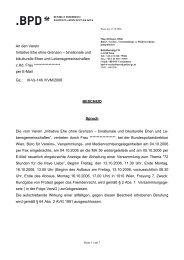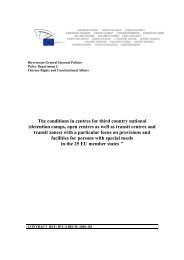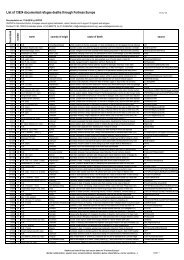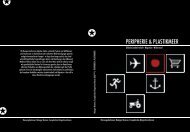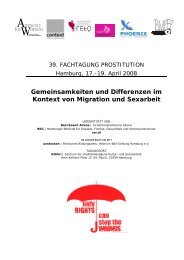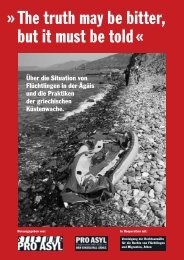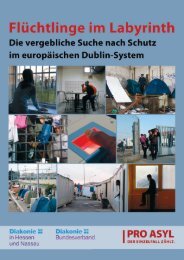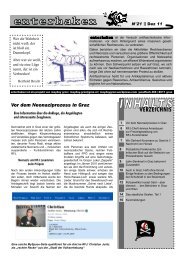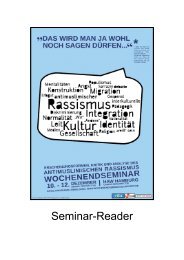Turin's CIE - International University College of Turin
Turin's CIE - International University College of Turin
Turin's CIE - International University College of Turin
Create successful ePaper yourself
Turn your PDF publications into a flip-book with our unique Google optimized e-Paper software.
asylum law 163 . In addition, decisions about applications must be given in writing and negative<br />
decisions must be motivated and written information must be provided explaining how to<br />
challenge negative decisions 164 . Finally, Member States must ensure that applicants have the<br />
right to an effective remedy before a court against negative decisions taken on their application<br />
for asylum 165 .<br />
Italian Law<br />
Italy transposed the three aforementioned EU directives into domestic law 166 .<br />
However, Italy’s treatment <strong>of</strong> asylum seekers and refugees has been considered as extremely<br />
controversial within the European Union, amidst international human rights NGOs and at Italy’s<br />
2010 Universal Periodic Review by the United Nations Human Rights Council 167 . For example,<br />
on 2 July 2012 the Administrative Court <strong>of</strong> Stuttgart in Germany decided that the applicant<br />
asylum seekers could not be sent back to Italy under the “Dublin II Regulation” 168 . In making<br />
their decision, the judges took into consideration the decision <strong>of</strong> the Court <strong>of</strong> Justice <strong>of</strong> the<br />
European Union <strong>of</strong> 21 December 2011 (C-411/10 and 493/10) and decided that if the applicant<br />
asylum seekers were returned to Italy they would be faced with the risk <strong>of</strong> “inhuman and<br />
degrading treatment” based on the “systemic deficiencies” <strong>of</strong> the asylum procedures and<br />
reception conditions in Italy. This recent decision is in line with similar assessments given in<br />
past months by other administrative courts all over Germany, such as the courts in Lüneburg,<br />
Freiburg, Karlsruhe, Dusseldorf, Augsburg, Gelsenkirchen and Magdeburg 169 .<br />
163 Directive 2005/85/EC, Article 7(3).<br />
164 Directive 2005/85/EC, Articles 9(1) and 9(2).<br />
165 Directive 2005/85/EC, Article 39.<br />
166 Decreto Legislativo 30 maggio 2005, n. 140 “Attuazione della direttiva 2003/9/CE che stabilisce norme<br />
minime relative all'accoglienza dei richiedenti asilo negli Stati membri” (GU n. 168 del 21-7-2005). Legislative<br />
Decree 30 May 2005, n. 140 “The implementation <strong>of</strong> Directive 2003/9/EC laying down the minimum standards<br />
for the reception <strong>of</strong> asylum seekers” (GU n. 168 <strong>of</strong> 21-7-2005); Decreto Legislativo 19 novembre 2007, n. 251<br />
“Attuazione della direttiva 2004/83/CE recante norme minime sull’attribuzione, a cittadini di Paesi terzi o<br />
apolidi della qualifica del rifugiato o di persona altrimenti bisognosa di protezione internazionale, nonché<br />
norme minime sul contenuto della protezione riconosciuta” (GU n. 3 del 4-1-2008). Legislative Decree 19<br />
November 2007 “The implementation <strong>of</strong> Directive 2004/83/EC on minimum standards for the qualification and<br />
status <strong>of</strong> third country nationals as refugees or as persons who otherwise need international protection and the<br />
content <strong>of</strong> the protection granted” (GU n. 3 <strong>of</strong> 4-1-2008); Decreto Legislativo 28 gennaio 2008, n. 25<br />
“Attuazione della direttiva 2005/85/CE recante norme minime per le procedure applicate negli Stati membri ai<br />
fini del riconoscimento e della revoca dello status di rifugiato” (GU n. 40 del 16-2-2008). Legislative Decree 28<br />
January 2008, n. 25 “The implementation <strong>of</strong> Directive 2005/85/EC on the minimum standards on procedures in<br />
Member States for granting and withdrawing refugee status” (GU n. 40 <strong>of</strong> 16-2-2008).<br />
167<br />
See for example: Amnesty <strong>International</strong>, Annual Report 2012, 2012<br />
; Human Rights Watch, Annual Report 2012: Events <strong>of</strong><br />
2011, 2012, 450-452 ; Thomas Hammarberg, Report by Thomas<br />
Hammarberg, Commissioner for Human Rights <strong>of</strong> the Council <strong>of</strong> Europe, following his visit to Italy from 26 to<br />
27 May 2011, CommDH(2011)26, Strasbourg, 7 September 2011; <strong>International</strong> Commission <strong>of</strong> Jurists, United<br />
Nations Human Rights Council 7 th Session Working Group on the Universal Periodic Review 8-19 February<br />
2010: ICJ Submission to the Universal Periodic Review <strong>of</strong> Italy, September 2009, 3; for a full list <strong>of</strong> questions<br />
raised and recommendations made to Italy at the Human Rights Council peer-based review process, see<br />
.<br />
168 Verwaltungsgericht Stuttgart, Urteil vom 12. Juli 1990-A 9 K 10452/89, A 9 K 10452/89, Germany:<br />
Verwaltungsgericht, 12 July 1990; Council Regulation (EC) No 343/2003 <strong>of</strong> 18 February 2003, establishing the<br />
criteria and mechanisms for determining the Member State responsible for examining an asylum application<br />
lodged in one <strong>of</strong> the Member States by a third-country national, L 50/1 Official Journal <strong>of</strong> the European Union<br />
25.2.2003 (“Dublin II Regulation”).<br />
169 For more details about the information that the Stuttgart Court considered in making their determination<br />
about the living conditions <strong>of</strong> asylum seekers in Italy, see the report done by the German NGO “Pro Asyl”:<br />
79 | P a g e




